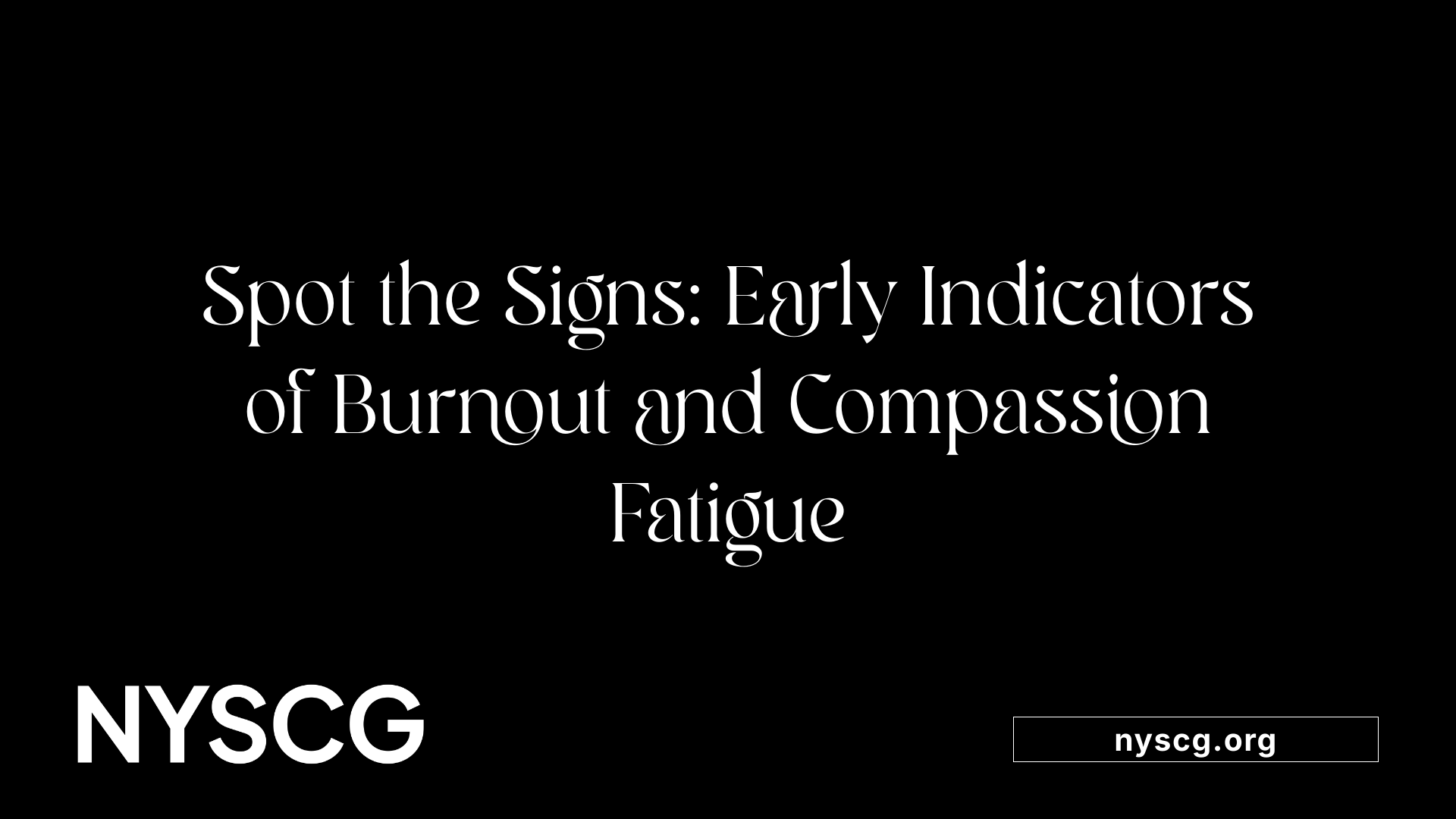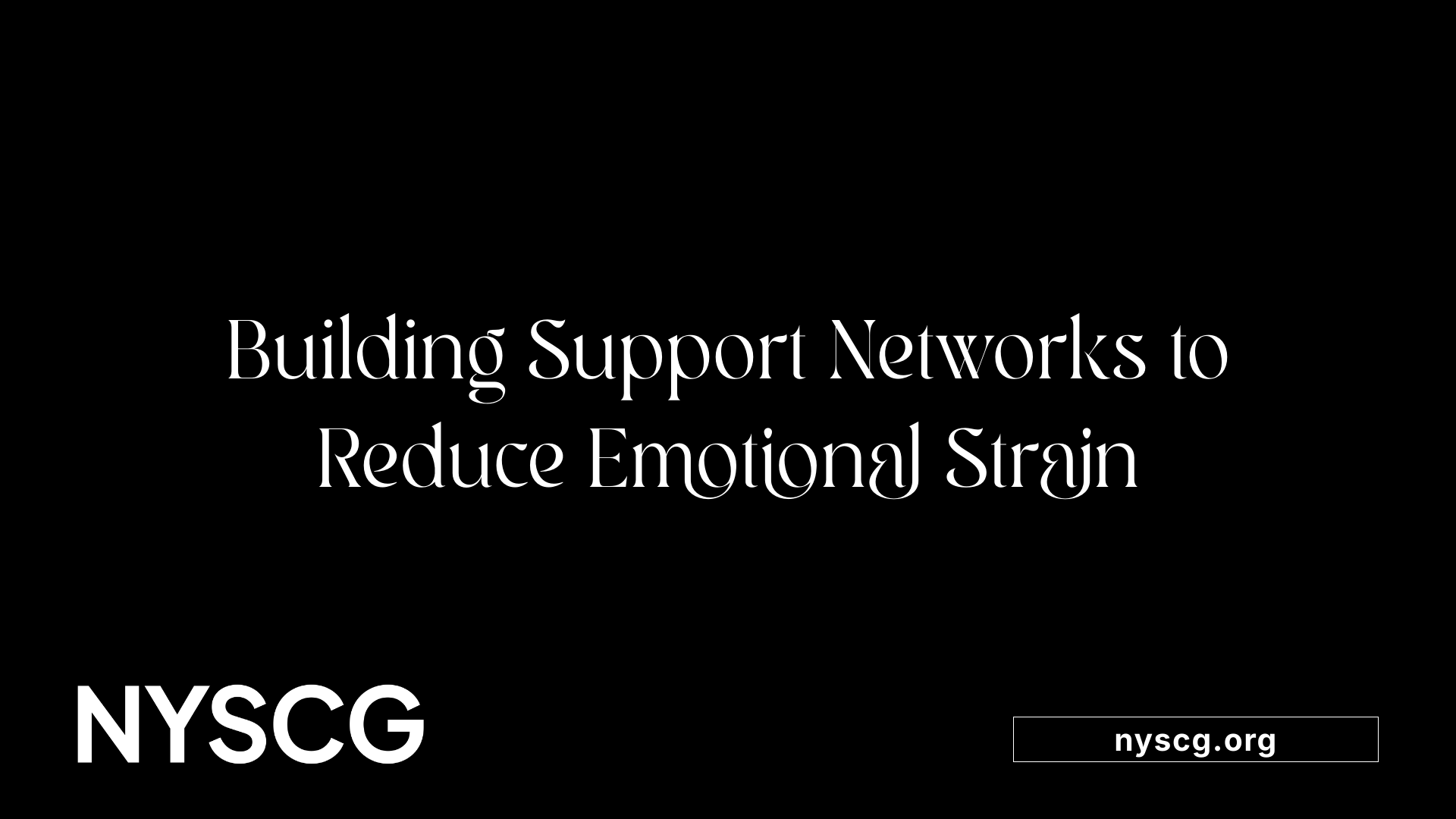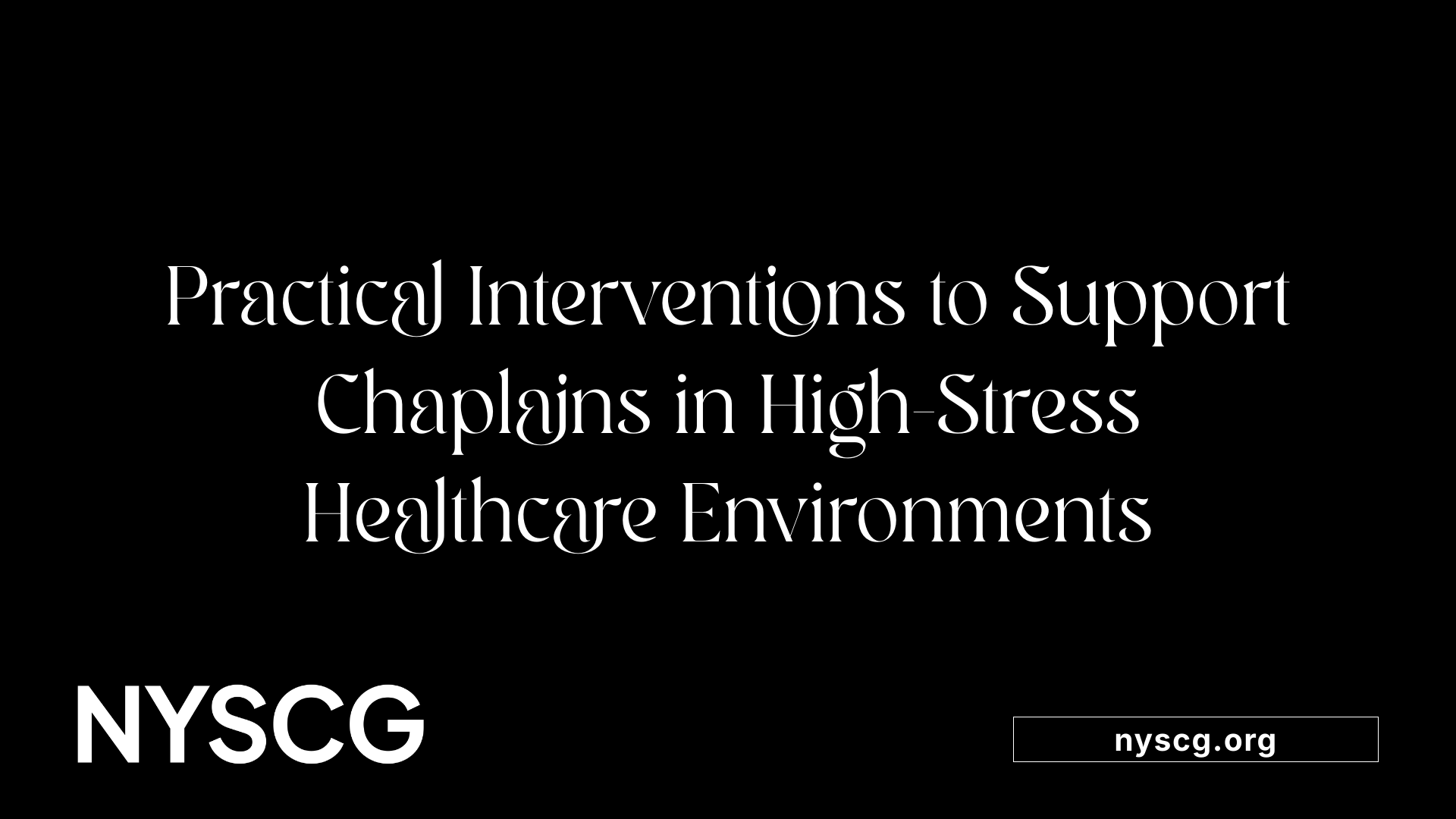How Do Chaplains Handle Burnout and Compassion Fatigue?


Chaplains serve on the front lines of emotional and spiritual support within healthcare and community settings, often facing high stress, trauma exposure, and systemic challenges. Burnout and compassion fatigue threaten their ability to provide compassionate care, impacting their mental, emotional, and physical well-being. Recognizing the signs, understanding contributing factors, and implementing effective coping strategies are crucial steps toward sustaining these vital caregivers.

Chaplains often face emotionally demanding roles, which can lead to burnout and compassion fatigue if unrecognized. Burnout symptoms typically include emotional exhaustion, frustration, cynicism, and feelings of hopelessness. Chaplains may withdraw from colleagues and activities they once enjoyed, and physical complaints such as persistent headaches, digestive problems, or chronic pain may develop.
Compassion fatigue, on the other hand, manifests through physical and emotional distress. It can cause emotional detachment from patients or clients, reduced empathy, and feelings of sadness or grief. Many chaplains experience a decrease in job satisfaction, sleep problems, difficulty concentrating, and social withdrawal.
Both conditions often present with negative emotions like anger, bitterness, or resentment. Over time, if these symptoms are not addressed, they can impair judgment and lead to serious mental health issues, including anxiety, depression, or posttraumatic stress disorder.
Recognizing these early warning signs is vital. Interventions such as engaging in regular self-care, setting personal and professional boundaries, seeking support from peers or mental health professionals, and organizational changes can help mitigate these symptoms. Being attentive to these signals helps maintain both mental well-being and the quality of spiritual care provided.
(For a broader understanding, various studies emphasize the importance of early recognition of emotional, physical, and behavioral indicators to foster healthier caregiving environments.)

Chaplains face numerous stressors that can lead to burnout, a state of emotional, physical, and mental exhaustion from prolonged exposure to demanding work conditions. High work demands, such as overwhelming caseloads and constant emotional involvement, are primary contributors. In hospital environments, these workload pressures are particularly prominent, with feelings of being bogged down by systemic issues and excessive responsibilities.
Organizational factors also play a significant role. When chaplains feel overwhelmed by systemic bureaucracy or lack adequate support structures, their risk of burnout grows. These systemic issues often limit access to resources like counseling or debriefing, hindering effective coping.
Protective factors such as self-compassion, a sense of purpose, supportive organizational structures, and mindful self-awareness serve as buffers against these stressors. Chaplains who actively engage in multiple self-care strategies—like reflection, relaxation, mindfulness, and fostering supportive relationships—tend to report higher job satisfaction and lower burnout levels.
The impact of burnout extends beyond emotional fatigue. It can manifest physically through symptoms like headaches, digestive issues, and fatigue, while emotionally, it can cause reduced empathy, feelings of hopelessness, anxiety, and depression. These symptoms impair a chaplain’s ability to support others effectively and maintain their own mental health, emphasizing the importance of addressing both workplace conditions and personal protective practices to sustain well-being.

Community support and professional resources are fundamentally important for helping chaplains handle the emotional challenges of their work. These networks provide affirmation, practical strategies, and a sense of belonging, which are crucial for mitigating burnout and compassion fatigue. Regular participation in peer debriefings, supervision, and continuing education helps chaplains maintain high standards and build resilience.
Supportive relationships with colleagues and external professional networks foster an environment of shared understanding and validation. This collegial environment enhances their self-efficacy and professionalism, reinforcing their mental health and emotional stability. Additionally, organizational and interprofessional collaboration, facilitated by role clarity and joint activities, improves understanding and appreciation of chaplains' unique contributions. Such appreciation can significantly reduce work-related stress.
Chaplains also benefit from emotional and spiritual support systems designed for their well-being. These resources empower them to serve others effectively while maintaining their own mental health. Overall, comprehensive community and organizational support are key to enabling chaplains to sustain their capacity for holistic care amidst the emotional demands of their role.
Organizational support plays a dual role alongside individual self-care in preventing burnout among chaplains. Systemic interventions target the root causes of stress and promote a healthy workplace environment. These include managing excessive work demands, offering access to mental health services like counseling, and providing stress management training.
Policies that encourage regular debriefing sessions, manageable caseloads, and boundaries between work and personal life are essential. Support programs such as wellness initiatives, peer support groups, and leadership-driven mental health policies create a culture of openness and support. These measures help chaplains feel valued and understood, reducing feelings of overwhelm and emotional exhaustion.
Moreover, fostering an organizational culture that prioritizes mental well-being not only prevents burnout but also improves job satisfaction and staff retention. When leadership commits to supporting staff through systemic changes and supportive policies, it creates a resilient and positive environment where chaplains can thrive and continue providing vital care for those in need.

Chaplains face unique emotional and spiritual challenges, making effective self-care crucial in preventing burnout and compassion fatigue. Engaging in diverse self-care activities is fundamental. Regular exercise, adequate sleep, and mindfulness practices such as meditation and prayer help maintain emotional stability. Self-compassion—being kind to oneself during difficult times—and purposeful reflection also serve as vital protective factors.
Building strong, supportive relationships with colleagues, supervisors, and personal contacts creates a network of emotional resilience. Many organizations support their chaplains by offering accessible counseling, stress management training, and ongoing education on resilience. Establishing clear work boundaries, managing caseloads effectively, and promoting work-life balance are essential organizational policies that significantly lessen burnout risk.
Chaplains are encouraged to develop personalized self-care routines that align with their values and spiritual beliefs. This includes regular debriefing sessions with peers or mentors, which can help process emotional stress. Mindfulness and emotional regulation techniques empower chaplains to stay present and manage their reactions during demanding situations.
Recognizing early signs of fatigue—such as emotional numbness, irritability, or sleep disturbances—and seeking support promptly are crucial steps. Incorporating spiritual practices and reflection into daily routines sustains their compassion capacity. Overall, combining proactive self-care, supportive relationships, and organizational support forms a comprehensive approach to maintaining mental health and providing effective, compassionate care.
This holistic strategy helps chaplains manage their workload without compromising their well-being, ensuring they remain effective caretakers for others while preserving their own health.

Healthcare organizations recognize the importance of actively supporting chaplains to prevent and address burnout. One common approach involves establishing peer support groups and regular supervision sessions. These forums allow chaplains to share experiences, process emotions, and gain insights from colleagues, which promotes emotional resilience and reduces feelings of isolation.
In addition to peer support, organizations often implement structured debriefing processes after critical incidents or emotionally charged appointments. This ensures that chaplains have opportunities to reflect, vent, and receive guidance, preventing emotional overload.
Stress management training is another vital element. Chapein leaders provide workshops on mindfulness, breathing exercises, and relaxation techniques, enabling chaplains to develop practical tools for coping with daily stressors. This training encourages regular self-care practices, which are proven to improve mental health and job satisfaction.
Creating a culture of care extends beyond individual strategies. Hospitals and care facilities foster an environment where open communication is encouraged, and emotional safety is prioritized. Leaders promote policies that support work-life balance, such as appropriate scheduling to avoid overload, encouraging regular breaks, and setting clear boundaries to prevent emotional exhaustion.
Institutional programs also play a role. Wellness initiatives like stress reduction workshops, expressive arts therapies, and recognition ceremonies acknowledging the vital role of chaplains help reinforce their value and foster a sense of community.
Further, providing access to professional mental health resources, including counseling services and resilience training, helps chaplains maintain their well-being. Recognizing the significance of spiritual health and incorporating it into organizational policies ensures chaplains feel supported holistically.
Collectively, these practical interventions create a supportive environment that promotes resilience, diminishes burnout risks, and sustains chaplains' ability to function effectively in high-stress healthcare contexts.
Self-awareness and emotional regulation are essential skills that significantly influence a chaplain's mental health and effectiveness. Being self-aware helps them recognize personal emotional states—such as signs of stress or compassion fatigue—early enough to take preventative actions. When chaplains can identify feelings of exhaustion or detachment, they can employ strategies like mindfulness, reflective practice, and self-compassion to stay resilient.
Emotional regulation skills allow chaplains to control impulsive reactions and maintain mental clarity during emotionally charged situations. Such control fosters healthier interactions with patients, clients, and colleagues, reducing the risk of burnout.
Developing these abilities not only benefits their personal well-being but also enhances the quality of care they provide. It contributes to a more balanced professional life, enabling them to stay compassionate and present even in challenging circumstances. Ultimately, integrating self-awareness and emotional regulation into their routine is vital for sustaining their emotional health, preventing burnout, and supporting long-term caregiving excellence.
Recent studies provide a comprehensive understanding of how to effectively prevent and manage burnout among chaplains. A significant finding is that combining personal self-care practices with organizational support yields the best results.
Chaplaincy professionals who regularly engage in activities such as self-compassion, mindfulness, and maintaining supportive relationships experience a higher quality of life and are less prone to burnout. These practices help build emotional resilience, allowing chaplains to cope with the stresses of their roles.
Organizational interventions are equally vital. Creating supportive work environments by managing caseloads, encouraging debriefing sessions, and providing access to counseling services can significantly reduce systemic sources of stress. When organizations address systemic issues like feeling overwhelmed by the workload or bureaucratic obstacles, the risk of burnout diminishes.
Research during the COVID-19 pandemic highlights that chaplains who actively utilized self-care routines and received organizational support reported lower levels of depression and compassion fatigue. These findings underscore the importance of a holistic approach that marries individual resilience practices with systemic changes.
Evidence suggests that a blend of personal strategies—such as prayer, meditation, physical activity, and reflective practice—and organizational policies aimed at workload management and emotional support create a sustainable framework. This synergy fosters long-term well-being and job satisfaction.
In summary, integrating targeted self-care activities with systemic organizational support, including staff training and systemic reforms, forms the foundation of effective burnout prevention strategies in the field of chaplaincy.
Creating a supportive organizational environment is essential for the well-being of chaplains. Leadership plays a vital role by demonstrating a clear commitment to mental health and emotional safety. This can be achieved through implementing policies that promote work-life balance, provide access to counseling services, and encourage open dialogue about emotional challenges faced by staff.
Establishing safe spaces where chaplains can openly share their experiences without fear of judgment encourages transparency and vulnerability. This openness helps in early identification of burnout signs and fosters mutual support among colleagues.
Supporting ongoing professional development is another crucial aspect. Offering training programs focused on stress management, emotional regulation, and resilience enhances coping skills. Such initiatives empower chaplains to handle their emotional demands effectively, reducing the risk of burnout.
Recognition and appreciation also strengthen organizational culture. Acknowledging chaplains’ contributions through formal awards, positive feedback, and public acknowledgment boosts morale and reinforces their value within the organization.
Furthermore, cultivating shared values centered on compassion and support nurtures an environment where mental health is a priority. When organizations embed these principles into their culture, chaplains are more likely to feel valued, supported, and equipped to perform their roles sustainably.
When organizations actively create a caring and open environment, chaplains experience increased job satisfaction, reduced stress levels, and a stronger sense of purpose. This positive environment helps them maintain emotional resilience, ultimately benefiting their clients and the organizations they serve.
For a comprehensive approach, integrating organizational policies with individual self-care practices leads to better mental health outcomes and sustainable caregiving environments.
| Strategy | Description | Expected Outcome |
|---|---|---|
| Leadership Commitment | Demonstrating support for mental health initiatives | Enhanced trust and safety |
| Open Communication | Creating spaces for sharing emotional experiences | Early burnout detection and peer support |
| Professional Development | Training in resilience, stress management | Increased coping skills |
| Recognition and Rewards | Acknowledging contributions publicly | Boosted morale and motivation |
| Cultivating Shared Values | Embedding compassion in organizational culture | A sustainable environment of support |
Research underscores that organizational support is as vital as individual self-care in preventing burnout. Addressing systemic issues such as workload and administrative pressures complements efforts to foster a compassionate workplace. In combining leadership initiatives, ongoing training, and recognition, organizations can sustain a resilient and supported chaplain workforce.
Understanding how chaplains manage burnout and compassion fatigue underscores the importance of integrating self-care, organizational support, and ongoing research. By recognizing early warning signs, investing in supportive structures, and fostering a culture of openness and resilience, healthcare institutions and communities can ensure that chaplains continue to provide vital emotional and spiritual support without compromising their own well-being. Sustaining these caregivers enables a compassionate, effective response to the emotional needs of the people they serve, fostering a healthier, more supported caregiving environment.
All you need is the will to make the world a better place.
New York State chaplain group inc. is a tax deductible organization with a federal tax Id number 92-383-4921